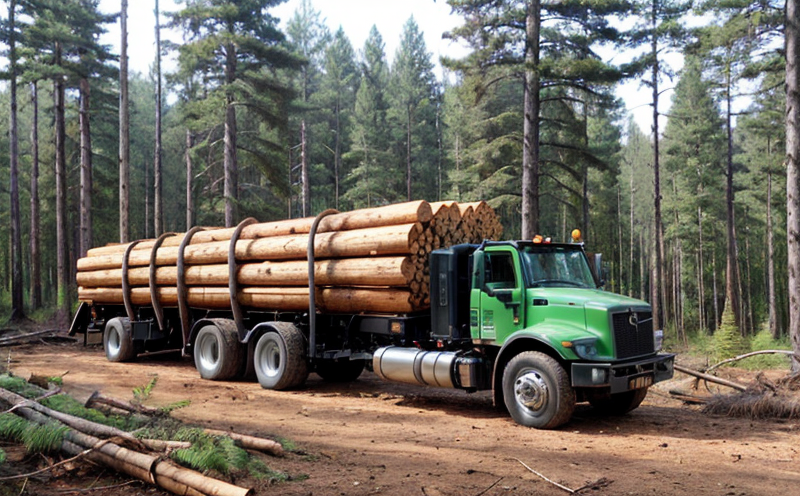Timber Impact Resistance Testing
The timber impact resistance testing is a critical procedure used to evaluate how well wood and other forestry products withstand dynamic impacts. This testing is essential in ensuring that materials meet safety standards, perform optimally under real-world conditions, and are suitable for various applications. In agriculture and forestry sectors, this test plays a vital role in assessing the durability of timber structures such as bridges, fences, and agricultural equipment.
The testing involves subjecting samples to controlled impacts using standardized methods designed to mimic real-life scenarios where wood might encounter sudden force or stress. The objective is to determine the material's resistance to impact without fracturing or compromising its structural integrity. This process helps in selecting suitable timber for specific applications, ensuring that products meet stringent quality and safety requirements.
Standardized testing protocols are crucial for consistency across different laboratories. For instance, ISO 17826 specifies the procedure for determining the impact resistance of wood materials using a drop-weight machine. The test setup includes a specimen mounted horizontally between two supports, which is then subjected to impacts from a falling weight. The height and mass of the weight can be adjusted based on the specific requirements of the test.
Proper sample preparation is another key aspect of this testing. Samples should be cut according to specified dimensions and prepared in a way that ensures uniformity across all specimens being tested. This includes removing any knots or defects, ensuring flat surfaces, and sanding edges if necessary. The specimen must also be conditioned under controlled humidity and temperature conditions before the test to simulate real-world environmental factors.
The results of timber impact resistance tests provide valuable insights into a material's performance characteristics. They help manufacturers optimize their processes by identifying areas where improvements can be made to enhance product quality. For quality managers, compliance officers, R&D engineers, and procurement professionals, this information is indispensable for making informed decisions about the materials used in their products.
Understanding the implications of these tests on various applications further emphasizes their importance. In agricultural settings, resilient timber structures are crucial for maintaining operational efficiency and safety. By using timber that has been tested for impact resistance, farmers can ensure that their equipment is durable enough to withstand harsh conditions without frequent maintenance or replacement. Similarly, in forestry operations, the ability of structural components to resist impacts ensures safer working environments.
- International Acceptance: Timber impact resistance testing adheres to global standards such as ISO 17826 and ASTM D3780, ensuring that results are universally recognized. Compliance with these standards is essential for exporting products internationally.
Eurolab Advantages
At Eurolab, we pride ourselves on offering comprehensive forestry testing services tailored to meet the specific needs of our clients in agriculture and forestry sectors. Our expertise lies not only in providing accurate test results but also in delivering reliable recommendations based on those findings.
We employ highly trained technicians who are well-versed in using state-of-the-art equipment for timber impact resistance testing. This ensures that every sample is tested under controlled conditions, leading to consistent and repeatable results. Our laboratories adhere strictly to international standards like ISO 17826, ensuring that our clients receive accurate and reliable test outcomes.
Our commitment to quality extends beyond just performing tests; it includes offering detailed reports that provide comprehensive analysis of the test data. These reports are designed to be easily understandable by all stakeholders involved in the project, whether they are engineers, quality managers, or procurement officers. By providing clear insights into the performance characteristics of timber samples, we empower our clients to make informed decisions about their product specifications.
We also offer additional services such as consultation on material selection and process optimization based on test results. This proactive approach ensures that our clients stay ahead in meeting regulatory requirements and market demands. Our goal is to support sustainable practices within the agriculture and forestry industries by offering solutions that enhance efficiency, safety, and environmental impact.
Customer Impact and Satisfaction
The rigorous quality control measures implemented at Eurolab have significantly enhanced customer satisfaction across various sectors, including agriculture and forestry. By consistently delivering accurate test results within tight deadlines, we ensure that our clients can plan their projects with confidence knowing they are working with reliable partners.
Our focus on continuous improvement has led us to invest heavily in training programs for our staff members, keeping them up-to-date with the latest developments in testing methodologies and technologies. This commitment translates directly into better service delivery and enhanced customer experience.
A key factor contributing to high customer satisfaction is our transparent communication channels. We maintain regular updates throughout each project lifecycle, ensuring that clients are always informed about progress and any potential issues. This level of engagement fosters trust between us and our customers, creating long-term relationships built on mutual respect and shared goals.
Moreover, Eurolab actively seeks feedback from satisfied customers through surveys and direct interactions. Constructive criticism helps identify areas for improvement, allowing us to refine our services continuously. By listening closely to customer needs and expectations, we aim to deliver even more value-added solutions in future projects.
International Acceptance and Recognition
- ISO 17826: This international standard provides guidelines for determining the impact resistance of wood materials using a drop-weight machine. It ensures consistency across different laboratories worldwide, making it easier to compare results.
- ASTM D3780: Developed by American Society for Testing and Materials (ASTM), this standard outlines procedures for measuring dynamic fracture toughness in wood specimens subjected to impact loading.
- EN 325: European Norm specifies requirements for the determination of resistance against mechanical impacts on wood products used in construction.
The acceptance of these standards by numerous countries around the globe underscores their reliability and relevance. Laboratories accredited according to these norms enjoy widespread recognition from regulatory bodies, certification organizations, and industry peers alike. Such accreditation enhances credibility and trustworthiness among stakeholders involved in international trade or projects requiring cross-border collaboration.





